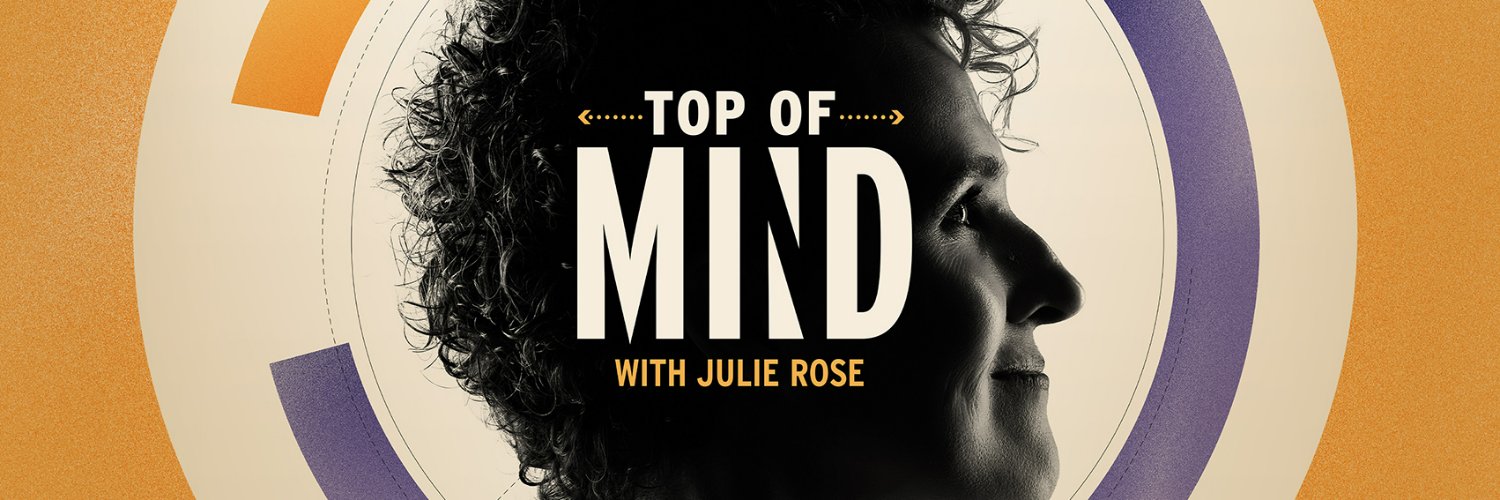
Top of Mind
@TopofMindpod
Podcast | Becoming better citizens, kinder neighbors and more effective advocates. Hosted by journalist @julieroseradio. A BYUradio production.
Sabine shares how her daughter’s social media use led to a mental health crisis. Should kids be allowed to have phones in school? Drop your thoughts in the comments, and hear the full story with Top of Mind, anywhere you get podcasts.
This episode dives into what happens when schools ban phones—and what happens when they don’t. From student experiments to parent pushback to teachers feeling burned out, we heard a wide range of experiences. What do you think is the right approach? Let us know in the comments!
Under U.S. law, being born on American soil makes you a citizen—no matter your parents’ immigration status. But some experts say that’s led to new dynamics no one anticipated. What do you think? Hear from multiple perspectives with this week's episode of Top of Mind.
The United States is one of fewer than 30 countries that offer unconditional birthright citizenship. For some, it represents American ideals of equality. For others, it raises tough questions about immigration and legal intent. Join the conversation with Top of Mind.

What does “subject to the jurisdiction thereof” really mean? And who gets to define it? This is one of the most important constitutional debates happening today—and it affects millions of lives. Dive deeper on Top of Mind, anywhere you get podcasts.
Is citizenship something you earn or something you’re born into? @abdisoltani executive director of the ACLU of Northern California, believes that granting citizenship at birth isn’t just policy—it’s a reflection of America’s best values: equality, inclusion, and opportunity.
To some, American citizenship means freedom, protection, and a future worth sacrificing for. But for those of us born here, do we still see it that way? From Ukraine to Miami, @kpanova watched women travel across the world for a chance at one thing: A better life for their child.
The Supreme Court just made a big decision on birthright citizenship. And we’re left with questions that go deeper than policy: Who counts as American? And who gets to decide? Join us on Top of Mind this week as we dive into the nuances of this issue.
Alcohol used to be a social default. Now, more people are rethinking what it adds (or takes away) from their lives. In this episode, Lisa explains why the conversation around drinking is shifting. Is being Sober-Curious the new trend? Listen now with Top of Mind.
We all know alcohol has long been part of American social life. But what happens when a new generation starts making different choices? On this episode of Top of Mind, we explore how alcohol became so woven into American culture, and why more people today are questioning it.

What starts as a way to take the edge off… can quietly take over. Sarah’s story is part of a broader shift happening in America. More people than ever are rethinking their relationship with alcohol. Hear from Sarah and more on this week’s episode of Top of Mind.
Alcohol is everywhere in American culture—at parties, dinners, networking events. For Sarah, that made early sobriety feel daunting. But it was support that got her through. In this episode of Top of Mind, we dig into why more people are rethinking their relationship with alcohol
If alcohol were required to tell the truth on the label, would people still drink it? You can read every ingredient on every other product. But alcohol? No nutrition info. No cancer warning. No serving size. And it’s a Group 1 carcinogen. Let's talk about it.
Alcohol is a Group One carcinogen. It’s also everywhere—in our offices, homes, and celebrations. This episode of Top of Mind looks at how we got here, and why more people are starting to ask if it’s time for a change. Listen anywhere you get podcasts.
We often talk about school integration like it’s history. But for most Black and Latino students in the U.S., schools are still deeply segregated—not by law, but by ZIP code, funding, and opportunity. So what would real integration look like now? Learn more with Top of Mind.

Not every child acting out is just misbehaving. Sometimes, it's trauma speaking the only way it knows how. In this clip, @andrysweet explains why true school integration has to go deeper than mixing students. We have to meet kids where they are emotionally, too.
We talk about Brown v. Board like a finish line. But for families like Dr. Noliwe Rooks’, it marked the start of something more complicated. How are these patterns continuing today, and what does REAL integration require? Join the conversation with Top of Mind.
Most Black and brown students in the U.S. still attend schools that are segregated by zip code and opportunity. So where does that leave us now? This week on Top of Mind, we’re talking about the unfinished story of integration—and the people reimagining what it could look like.
Before you agree to anything with your credit card, ask yourself, do you really understand the terms? @EconWithNick says too many people are walking into debt they don’t understand. This is your sign to slow down, ask questions, and make sure you know what you’re agreeing to.
Ever notice how it feels easier to swipe a credit card than to hand over cash? There’s a reason for that. Credit cards activate the pleasure centers of your brain, while cash and debit trigger pain. Studies show you're probably spending more than you think. @michaelreynolds